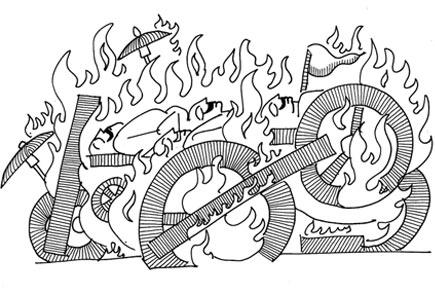Current storytelling yearns for happy endings. Traditional storytelling ends with sukhant. Sukhant is not happy ending, but a good ending, one in which the audience leaves the theatre wiser

 Current storytelling yearns for happy endings. Traditional storytelling ends with sukhant. Sukhant is not happy ending, but a good ending, one in which the audience leaves the theatre wiser. Indian epics are not about telling how the good defeated the bad, how a hero succeeds on his quest, but about how life, and death, goes on uninterrupted, irrespective of the intervention of the gods. Eventually Ram and Krishna have to die. Eventually Dwarka has to fall. Eventually the Pandavas have to retire and renounce. And then new ideas come — germinating saplings that look at the same world again, anew, afresh, often repeating the same mistakes and grappling with the same issues as Kaikeyi and Kunti. The world changes, yet remains the same. Technology transforms but nature stays static.
Current storytelling yearns for happy endings. Traditional storytelling ends with sukhant. Sukhant is not happy ending, but a good ending, one in which the audience leaves the theatre wiser. Indian epics are not about telling how the good defeated the bad, how a hero succeeds on his quest, but about how life, and death, goes on uninterrupted, irrespective of the intervention of the gods. Eventually Ram and Krishna have to die. Eventually Dwarka has to fall. Eventually the Pandavas have to retire and renounce. And then new ideas come — germinating saplings that look at the same world again, anew, afresh, often repeating the same mistakes and grappling with the same issues as Kaikeyi and Kunti. The world changes, yet remains the same. Technology transforms but nature stays static.
ADVERTISEMENT
I made a philosophical comment to my friend about how when nature shrugs, she does not care who she kills — Kauravas and Pandavas or Krishna or Ram. She is indifferent to human ethical dilemmas. Her intervention ends all conflicts. He then told me about the Aceh. Aceh? What was that?

Illustration / Devdutt Pattanaik
And then I learned about this province in Indonesia to the North of the island of Sumatra. It is the first place in South East Asia where Islam arrived as early as the 7th century. Aceh is an ethnic group that is fiercely independent and have fought outsiders: the Dutch in the colonial period and the Indonesian state in the post-colonial period. The reasons for the conflict range from the ethnic (anti-Javanese sentiment) to the religions (Aceh are more conservative Muslims) to economic (Aceh have massive oil and gas reserves) and political (right to self-determination). It has been a long fight, and like conflicts around the world, there is no clearly defined villain or victim. The armed conflict has resulted in little or no Western tourism. It is easy to attack the ‘state’. It is easy to reduce the conflict to ‘anti-nationalism’ or ‘Islamic radicalism’. The fact is, we in India, are completely oblivious of this battle as it does not involve us. I am sure the Aceh people, and Indonesians, would get offended if we displayed our ignorance and indifference, as Indians got upset when Maria Sharapova declared she had never heard of Sachin Tendulkar.
But then came a tsunami in 2004. The entire province was wiped out. Most of the 200,000 people killed came from this province. Some, rather cruelly, declared the event on Boxing Day (one day after Christmas) as the wrath of Allah against Muslims for fighting Muslims. Shaken up badly, the natural disaster paved the way for peace in 2005. There seemed nothing to fight for.
This is called Shamshan Vairagya, in Hinduism, the feeling of letting go of all rage and possessiveness and desire after attending a funeral ceremony. Sadly, it does not last long. And there are rumours that the conflict is on the cusp of restarting now a decade of peace later. Ram and Krishna may come and go, but dharma will never be permanent and war will always be an option.
The author writes and lectures on relevance of mythology in modern times, and can be reached at devdutt@devdutt.com
The views expressed in this column are the individual’s and don’t represent those of the paper.
 Subscribe today by clicking the link and stay updated with the latest news!" Click here!
Subscribe today by clicking the link and stay updated with the latest news!" Click here!






